Locals Enjoy The Ribble's Winter Wildlife
The Save The Ribble Winter Wildlife Walk on Sunday 28th January, in which we were joined by the Preston Society, was a great afternoon out by the Ribble. More than 50 assorted local Penwortham and Preston residents (with assorted pooches and pushchairs) walked from the Old Tram Bridge downriver to Priory Park, then back upriver and finishing just past the Broadgate mudflats on Old Penwortham Bridge.

The Kingfishers by the Tram Bridge were ever elusive (except when you least expect them of course!), but Goosander were around from here right down to the furthest end of the walk, as was a Moorhen and a good number of Mallard.
On this first stretch, alongside the Ribble and the Penwortham Green Belt, there were Long Tailed Tits and a Wren in the hawthorn alongside the meadow, Thrushes on the meadow itself, and a single Redshank on the mudflats nearest the Tram Bridge, and unusually for such shy birds this one didn’t seem to mind the impressive and impressed crowd one bit…

The Herons at the Heronry were also being elusive... but a Robin was singing beautifully as we wandered past…

Such a large group inevitably became spread out as the keen walkers surged on ahead while the amblers and binocular-busy took their time…
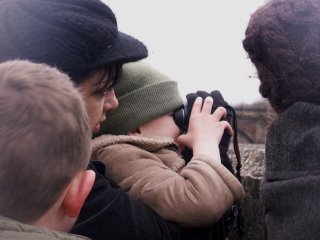
Junior Ribblers
We re-grouped on Old Penwortham Bridge then set off once more...
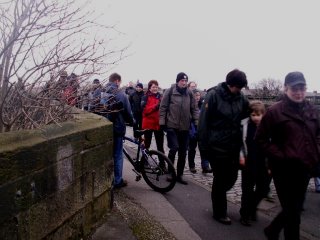
...down through Penwortham Holme and past the Broadgate mudflats on the opposite side, over Liverpool Road and downriver past the mudflats and shingle banks to Priory Park… a number of Redshank and most of the Cormorants flew off downriver as we approached (not keen on large-group watching, obviously!) although one keen angler did come back and continue fishing for his supper.
The Ribble and its green belt areas offer a wide habitat range for water-dwelling wildlife and land-dwelling...
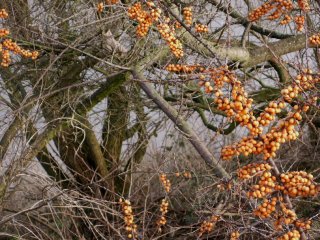
Winter food and habitat for hedgerow and farmland birds, many resident all year round, and many migratory species who travel for thousands of miles from Southern Europe, Scandanavia, and Africa (including crossing the Sahara Desert) to breed here in the Summer months. Hedgerow and farmland birds have declined by 50% in recent decades: we need to protect their habitats as a matter of urgency.
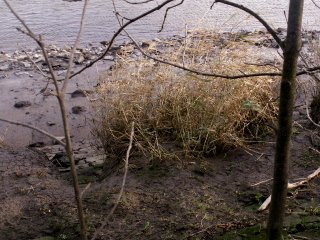
Marshgrasses and mudflats for our resident River birds and our Winter visitors from Iceland, Northern and Eastern Europe, Russia, and even the Arctic circle. Many of these species are also in decline, both nationally and internationally - some very seriously - due to habitat loss...
You can read more about why the Ribble's Saltmarsh and Mudflats are so important here.
The Ribble's Winter visitors also include Mallard as these birds also migrate to Britain from Iceland, Northern Europe, and Russia in the Winter months to join our resident Mallard. Perhaps surprisingly, for such seemingly "common" birds, Mallards are another species which has been in decline in recent decades.

Goosander and Mallard
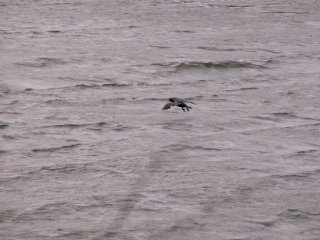
Cormorant

Black-Headed Gulls - some already showing their breeding-season black caps as these, like many birds, are taking the unseasonably mild weather to be Spring, which could add to the problems many species face if they start laying their eggs before Winter finally arrives.
On the way back upriver, the group dispersed even more as the keen walkers walked keenly and the lingering lingered… and were rewarded with a good number of Redshank with the Mallards and Blackheaded Gulls on the Broadgate mudflats – the Redshank are not only shy but very difficult to spot unless they are on the water line as they blend in with the mudflats and stones so completely so much more difficult to spot… they were probably there all the time!
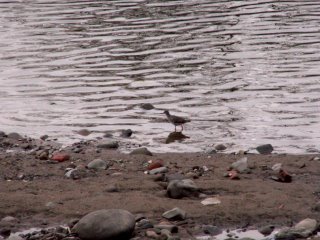
Redshank in Broadgate
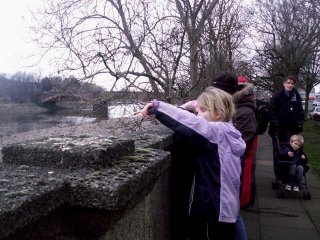
Junior Wader watchers in Broadgate
Stephen H. from the Preston Society said
“Thanks very much for inviting us to join you today… we all enjoyed it very much. It's not easy with a group a large as that… we saw Cormorant, Redshank, Goosander, Large numbers of Mallard, many Black-headed gulls, Carrion Crow, Moorhen, Teal, Woodpigeon, Magpie, Pied Wagtail, Chaffinch, Several Great Tit, 10+ Mistle Thrush (flew over the tram bridge on our return), Mute Swan, plus the Long Tailed Tits...
At this time of the year, and in those conditions, it's not a bad list. On your own, if you stopped in one place for a while waiting for things to reveal themselves, there's no saying what you might see…”
Thanks Stephen, and your colleagues from the Society who also joined us - if anyone would like to know more about the Preston Society, they can find it at www.prestonsociety.co.uk .
Thanks to everyone who joined us on our Ribble Winter Wildlife Walk – see you for our next event in early Spring when we’ll be walking upriver to Brockholes: this will be an all-day event as we’ll want to spend a good while at the new Brockholes Wetland Nature Reserve that local Ribbleside people helped the Wildlife Trust to save!
You can email us at savetheribble@tiscali.co.uk
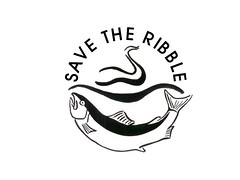










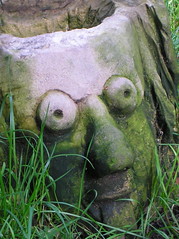



0 Comments:
Post a Comment
<< Home